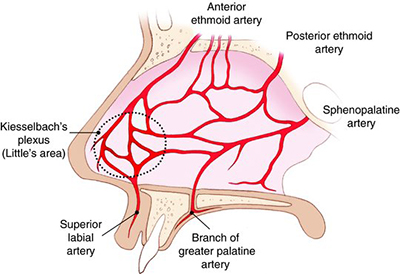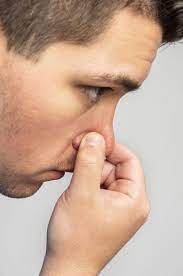Nosebleeds

Understanding Nosebleeds:
Nosebleeds, also known as epistaxis, occur when blood vessels in the nose rupture and bleed. While nosebleeds can be alarming, they are usually not a cause for major concern. They can be categorized into two types: anterior nosebleeds and posterior nosebleeds.
Anterior Nosebleeds:
Anterior nosebleeds originate from blood vessels located in the front part of the nose. They are the more common type and are typically easier to manage. Anterior nosebleeds often occur as a result of environmental factors, such as dry air, allergies, or irritation from excessive nose picking. They usually involve bleeding from one nostril.
Posterior Nosebleeds:
Posterior nosebleeds are less common and are caused by bleeding from the deeper part of the nose, further back in the nasal cavity. These nosebleeds often require medical attention, as they may involve heavier and more prolonged bleeding. Posterior nosebleeds are more commonly seen in older adults, individuals with hypertension, or those with blood clotting disorders.
Common Causes and Risk Factors of Nosebleeds:
1. Dry Air: Dry environments, especially during colder months or in arid climates, can lead to nasal dryness and increased vulnerability to nosebleeds.
2. Trauma or Injury: Any injury to the nose, whether from a fall, blow, or harsh nose picking, can cause blood vessel rupture and result in a nosebleed.
3. Nasal Infections or Allergies: Inflammatory conditions like sinusitis, rhinitis, or allergies can cause nasal congestion and lead to nosebleeds.
4. Medications: Certain medications, such as nasal sprays or blood thinners, may increase the likelihood of nosebleeds.
5. Environmental Irritants: Exposure to chemicals, pollutants, or irritants like cigarette smoke can irritate the nasal lining, making it more susceptible to bleeding.
Treatment and Prevention of Nosebleeds:
Dr. Seejo George offers a comprehensive approach to treating and preventing nosebleeds, addressing the underlying causes and providing effective solutions. Depending on the severity and frequency of the nosebleeds, treatment options may include:
1. Direct Pressure: Applying pressure to the nose by pinching the soft part of the nostrils together can often stop a nosebleed.

2. Moisturizing Nasal Sprays: Prescribing saline or moisturizing nasal sprays helps combat dryness and minimize the risk of recurrent nosebleeds.
3. Cauterization: In severe or frequent cases, Dr. Seejo George may recommend cauterization, a procedure in which a heat-based or chemical agent is used to seal off the bleeding blood vessels and prevent future episodes.
4. Identifying Underlying Conditions: Dr. Seejo George will conduct a thorough evaluation to identify any underlying issues, such as sinus infections or allergic rhinitis, and develop a customized treatment plan to address these conditions.
Preventing future nosebleeds often involves simple lifestyle adjustments. Dr. Seejo George will provide guidance on:
- Practicing proper nasal hygiene, including gentle blowing of the nose and avoiding forceful nose picking.
- Using a humidifier or saline sprays to maintain nasal moisture.
- Applying a thin layer of petroleum jelly inside the nostrils to prevent dryness.
- Avoiding nasal irritants and pollutants whenever possible.
Expert Care for Nosebleeds:
With years of experience in treating nosebleeds, Dr. Seejo George is dedicated to providing individualized care and effective solutions. He understands the discomfort and concern that nosebleeds can cause and is committed to helping patients find relief.
If you're experiencing recurrent nosebleeds or have concerns about your nasal health, we encourage you to schedule a consultation with Dr. Seejo George. Through a comprehensive evaluation, he will accurately diagnose the underlying causes and develop a personalized treatment plan tailored to your specific needs.
Contact us today to schedule your consultation and take the first step toward resolving your nosebleed concerns. Dr. Seejo George and his team are here to support you on your journey to improved nasal health and overall well-being.






